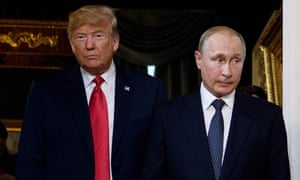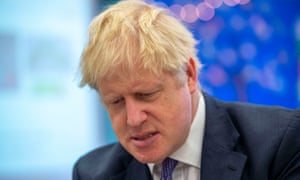Luke Cooper
Mon 28 Oct 2019 08.00 GMT

‘Donald Trump and Vladimir Putin share an ideological belief in the language of race and nation combined with a winner-takes-all view of international diplomacy.’ Trump and Putin together in Helsinki in July 2018. Photograph: Brendan Smialowski/AFP/Getty Images
The rise of nationalism and the historic threat to liberalism sweeping the global system poses big strategic questions for European democracies. Donald Trump and Vladimir Putin share an ideological belief in the language of race and nation combined with a winner-takes-all view of international diplomacy. By undermining the multilateral system the new authoritarians threaten a return to the assumptions of a previous era: a world of empires, not institutions.
This makes Europe a central crucible for what happens next. As the Yale historian Timothy Snyder argues, the EU is largely made up of states that were forced to give up their empires and so had no choice but to pursue multilateralism. Europe’s nationalists substitute the realities of this history with the national myth. They have become a major part of the EU’s own internal politics as the likes of Matteo Salvini, Viktor Orbán and Jarosław Kaczyński develop a fierce challenge to liberalism.
This raises a question over how democratic leaders should behave in the face of a new generation of statesmen who do not believe in mutual cooperation. Here the German sociologist Max Weber might help us. He drew a distinction between conviction and responsibility. He warned that acting with conviction could be wrong if the consequences were negative. Blaming others for the results was of limited value. Instead it was better to take responsibility and reckon directly ‘‘with exactly those average human failings”. But what if, we might wonder, it can also be irresponsible to refuse to act out of conviction? For the EU looks most at risk of precisely this failing.
Despite all the focus on Brexit there was not one but three decisions made at the recent European council that were of high significance to the future of Europe and the world. And a failure to act with conviction to defend liberal values could be seen across each.
First, the EU struck a deal with Boris Johnson that endangers economic cooperation in Europe. While it is true that the agreement preserves the EU’s red lines in relation to the Irish border, it has little else to recommend it. By moving most of the UK in the direction of a basic future relationship with no safety net on workers’, consumer and environmental rights, the deal would create an aggressively deregulating competitor in the EU’s geographical neighbourhood. Johnson would go swiftly into the arms of Trump’s America, combining clearly the toxic mix of nationalism and free market economics that is threatening global democracy. The US has promised a fast-track trade deal within nine months. “It’s a great win for us,” a British government spokesperson said just weeks ago.
Second, with Turkey having attacked Kurdish-controlled areas in Syria, the EU chose the easy path of condemnation over action, declining to pursue either tough economic sanctions, military assistance to the Kurdish resistance or peacekeeping forces. This decision compounded existing EU failures on Syria. EU states have treated the refugee crisis as a security, not humanitarian, issue, to be largely resolved by agreement with Turkey to keep migrants out by force. Backed by Putin, the Assad regime has now moved into the Kurdish areas, signalling a major victory and the defeat of Syria’s democratic hopes.
Third, EU leaders reneged on historic promises to the peoples of the Balkan region, declining, under pressure from France, to begin accession talks with North Macedonia and Albania. In a decision many believed to be motivated by French domestic hostility to immigration, Emmanuel Macron has strengthened nationalists across the Balkan region.
Some will argue that the Brexit deal was inevitable once Johnson backed down. But the EU is perfectly capable of acting in a pragmatic and political way. For instance, with Salvini gone from the Italian government, the European commission is likely to show greater flexibility over the Italian budget deficit. And it was within the power of the European council to delay a deal with the UK. It could have argued, quite reasonably, that Johnson had only brought credible proposals at the 11th hour. This would have compelled him to seek an extension and in all likelihood would have led to a UK general election in which he was forced to stand on a “no deal” platform.
These decisions may turn out to have been serious missteps in the global drift to authoritarianism. Recognising that democracy is facing an international attack should be the starting point for European diplomacy. We should be seeking to build an EU that is open to the rest of the world and committed to democracy, the rule of law and social justice with a forceful approach to the far right. Instead, the opponents of global democracy, I fear, have been strengthened.
• Luke Cooper is an associate researcher and consultant at the LSE Conflict and Civil Society Research Unit and a co-founder of the Another Europe Is Possible campaign
https://www.theguardian.com/commentisfree/2019/oct/28/europe-bullies-threaten-democracy
